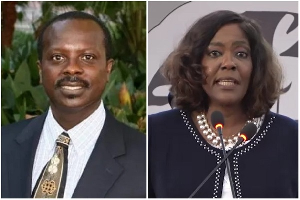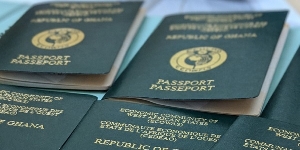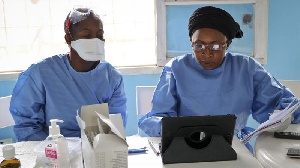Exactly 39 years ago today, September 24, 1979, the Third Republic took off with the handing over of power from a military regime to a civilian administration.
The Armed Forces Revolutionary Council (AFRC), led by then Flight Lieutenant Jerry John Rawlings, handed over power to Dr Hilla Limann following a presidential election that went into a run-off, with Dr Limann emerging as the winner.
It is important to throw some light on the events that had preceded the 1979 elections and the subsequent handing over of power.
Born on June 22, 1947 and at the age of 32, Flt Lt Rawlings burst onto the political scene after leading the AFRC, made up of young military officers, in an uprising on June 4, 1979 that saw the overthrow of the Supreme Military Council (SMC II), another military regime led by General F.W.K.
Akuffo.
Rawlings thus became the youngest Head of State the country has ever had.
The June 4 Uprising was an expression of the people’s anger at years of misrule. But, clearly, the successful revolutionaries had no road map or any blueprint for the future.
The cry of “let the blood flow” by the junior ranks of the military, workers and students was a call to punish and take revenge on those who were perceived blamable for the years of hardship and oppression.
With his emergence on the political scene, J.J. Rawlings succeeded in diverting the swelling anger of the junior ranks of the military and other groups into a crusade for probity and accountability.
Probity and accountability
On Monday, June 18, 1979, general election took place and the People’s National Party (PNP), an offshoot of the Convention People’s Party (CPP) and made up largely of Nkrumah elements, narrowly won parliamentary majority, but the presidential contest was too close to call and a run-off between Dr Limann of the PNP and Victor Owusu of the Popular Front Party (PFP), an offshoot of Dr Busia’s Progress Party (PP), was scheduled for July 9, 1979, which Dr Limann won by a narrow margin.
Following the elections, which were deemed to be free and fair, there was the inclination on the part of Rawlings that the June 4 Uprising would awaken in the new administration the need to abide religiously by his mantra of probity and accountability.
A little over three months after June 4, following the handing over, Dr Limann pledged an open and honest government.
However, after two years, the expectations of the young coup maker and his cohorts suffered a major disappointment, as it became increasingly clear that the government had reverted to what was termed “business as usual”.
Allegations raised against the Limann government included contracts and import licences being shared among ministers and cronies, while the public suffered unduly by queueing for consumables such as bread, soap and kerosene.
More so, factory workers, who had been inspired by June 4 to demand probity at their workplaces, were allegedly being deliberately corrupted by being allocated some of the goods which they produced, so that they could sell them at the factory gates at “kalabule” or exorbitant prices.
While not much was done to arrest the deterioration of the country’s infrastructure, later investigations of State Protocol requisition books revealed that Limann’s Cabinet meetings consumed huge amounts of hard liqueur.
The second coming of Rawlings
Rawlings remained at his post in the military until he was abruptly dismissed.
Following his abrupt dismissal, he traversed the length and breadth of the country, speaking and engaging with youth groups and helping them to establish farms.
His activities did not sit well with the security services, who continued to harass him with the view of discouraging those activities.
After some period of sober reflection and conferment with like-minded people, especially in academic institutions, business people, members of the public, as well as the military, it became somehow obvious to him that the elections and the subsequent transfer of power to the new administration of Dr Limann, rather than restoring hope and righting the wrongs that had necessitated the June 4, 1979 Uprising, had exacerbated the situation, with the tendency to get out of hand.
The posture of Rawlings was that power had been handed over to a group of elites who were using their elitist status to rip the country off, while the people wallowed in poverty and had no much say in the management of the affairs of the country.
What was needed was time to prepare the people to become part of the decision-making process; hence, the coup of December 31, 1981.
Rawlings took back control of the country as Chairman of the Provisional National Defence Council (PNDC) and ruled for 11 years.
Transition to the Fourth Republic
The next step taken by the PNDC towards building a new democratic system was to give the National Commission for Democracy (NCD), under the chairmanship of Justice Daniel F. Annan, the task of collecting and collating the views of the people on how best to design a new local government system.
This task was carried out in 1986 and early 1987 through a series of public fora held in all the regions, with representations from every administrative district. The participants included soldiers and policemen, teachers and nurses, farmers and fishermen, lawyers and engineers, chiefs, clergymen, PNDC secretaries and members of the CDRs and 31st December Women’s Movement.
The various process thereafter paved the way for the formation of political parties and the nomination of candidates for parliamentary and presidential elections.
Elections were held in December 1992, and, being the first national elections to be held since June 1979, it was crucial that they be closely monitored by both the Electoral Commission (EC) and observers, both local and international.
Rawlings retired from the army in 1992 and formed the National Democratic Congress (NDC) on whose ticket he stood as a candidate in the 1992 general election and won by over 58 per cent.
He went on to win another election in 1996 and retired in 2000, as the Constitution barred him from going for a third term.
Any lessons to be learnt?
Rawlings emerged on the scene in his quest to enforce probity, accountability and social justice for all in society for what he detected as corrupt practices and the looting of the state coffers by the ruling class of his day.
Characteristically, revolutions arrive on the back of wide social breakdown, extreme suppression and excessive corruption by people who have been entrusted with power to govern.
One reason for the overthrow of the Limann administration was the prevalence of corruption that was championed by government officials and their associates which brought about untold hardship to the masses.
The economy was out of control and the country was described as a collapsed state by some international donors.
The political administration of the country was paralysed, as political indiscipline, internal division and rancour and a sabotage by Parliament in refusing to approve the national budget submitted for approval culminated in bringing the government machinery to a standstill.
That is to say the political elite, who has been given the privilege of steering the affairs of state, must not take the concerns of the masses for granted.
This is because they rode to power on the back of the people they now rule and that is why conscious efforts must be made to listen critically to the sentiments of the ordinary person at the grass-roots level.
Rather unfortunately, political elites within this space of 25 years of democratic governance have had the tendency to surround themselves with sycophants who always tell them what they want to hear — a clear departure from the sentiments of the ordinary people.
Yes, while it is the wish and hope of all Ghanaians that Ghana did not see a recurrence of military takeovers, it is, indeed, prudent that any government that finds itself in power places the interest of the masses above all other considerations.
We ought to be reminded constantly that revolutions all over the world have not been exclusively undertaken by the military.
If for nothing, there are recent examples of social uprisings that have altered the course of the history of countries because there is a certain limit to the tolerance of the masses and experience has shown clearly that civil uprisings could be more devastating than military takeovers and that truism must not be lost on our conscience as a people.
Opinions of Monday, 24 September 2018
Columnist: dailyguideafrica.com















